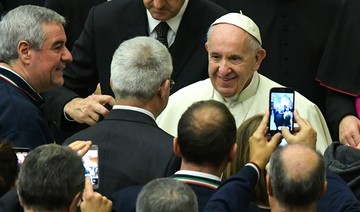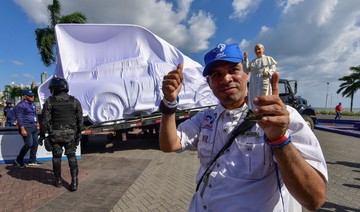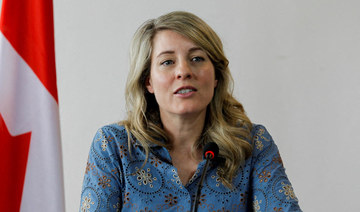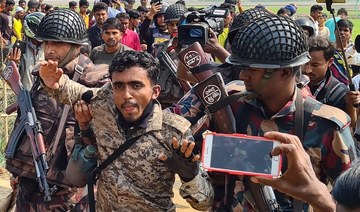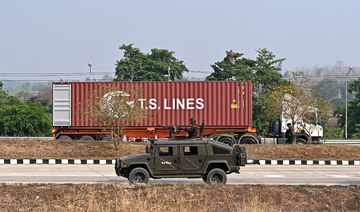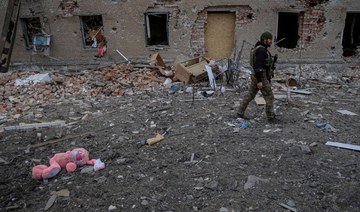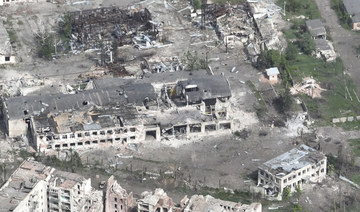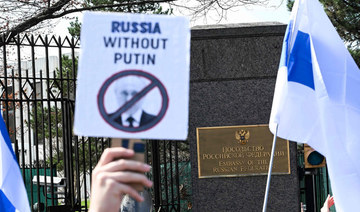GUATEMALA CITY: When Pope Francis visits Panama this week, he arrives not only as the first Latin American pontiff to visit Central America but as perhaps the world’s most prominent advocate for migrants at a time when migration has become a pressing political issue in the region and elsewhere.
The Argentine-born son of Italian immigrants has long held the issue dear to his heart and has signaled that it will be a central theme during the trip, which comes as the latest caravan of Central Americans is wending its way toward the US-Mexico frontier and President Donald Trump’s promised border wall has led to the longest government shutdown in the country’s history.
Francis’ emphasis on fundamental Christian teaching about welcoming the stranger, clothing the naked and feeding the hungry has been a breath of sustenance for those involved in efforts to aid migrants in Central America and Mexico, where Catholic priests, nuns and laypeople have taken the lead on attending to migrants amid what is often a vacuum of inaction and indifference by governments — or even outright hostility.
“It has been so hard, even within the church itself, to convince (people) that helping migrants is precisely part of the work of the church,” said Lidia Mara Souza, coordinator of the group Pastoral of Human Mobility in Honduras.
“But the pope has supported us tremendously, and I think now he comes to help us,” added Souza, a nun of the Scalabrinian order, which aids migrants as its vocation and is present along the length of the migratory route. “He must remind the politicians who declare themselves to be Christians to be that for real.”
The migratory trail north from Mexico and the violent Northern Triangle region of Central America is fraught with peril. Criminal gangs control much of the route and prey upon migrants, who are often stigmatized and face discrimination as they travel distances as long as 3,000 miles (5,000 kilometers) with little but dreams in their backpacks.
All along the way, they rely on a network of support in the form of Catholic-run shelters where they can find a place to sleep, be safe from the cartels and get a meal or advice.
Scalabrinians were among the first to start ministering to migrants in this part of the world, in the mid-1980s opening a shelter in Tijuana, across from San Diego. At the time, migration was largely an ignored phenomenon, said Bishop Raul Vera of Saltillo in northern Mexico, one of the first Mexicans to get involved in the cause.
Little by little, Vera said, the network of safe houses tied to the church sprang up over the following decades to reach the current number of over 80 in Mexico, El Salvador, Guatemala and Honduras.
“The migrants became the messengers,” the bishop said. “They told us, ‘Here they mistreat us, here they receive us well.’ And that way we began to see that in many places we were duplicating efforts and we began to coordinate among ourselves.”
In Honduras, Souza recalled, nuns attended to refugees from civil wars in El Salvador, Guatemala and Nicaragua, but soon they realized that many people were also leaving that country and still more were being returned from the United States. Now their main focus is on deportees, who in some ways are the most vulnerable.
“When the systematic deportations from the United States began, those who came back were people linked to the gangs, and I think the stigma was created that deportees are criminals and we shouldn’t help them,” Souza said.
Today many deportees to Central America are people who fled gang threats in the first place, and are sometimes hunted down and murdered once back home.
Shelters have expanded the services they offer to include medical, legal and psychological aid. Workers have also had to learn how to attend to migrants victimized by gangs — robbery, kidnapping, extortion, sexual assault, murder or disappearance.
“It has been very hard,” said the Rev. Alejandro Solalinde, who runs a shelter in Ixtepec in southern Mexico where human trafficking is big cartel business. “We are talking about organized crime and authorized crime,” he added, a reference to complicity by authorities.
Vera said Francis has given clear instructions on attending to migrants that can be summed in four verbs: welcome, protect, promote and integrate.
Putting those into practice is more important than ever in the face of caravans born out of poverty and violence in the region, according to Mauro Verzeletti, director of the Casa del Migrante shelter in Guatemala City.
“From now on it will be a modality of the migratory phenomenon because the countries of Central America have collapsed and are not working for the welfare of the people,” Verzeletti has said in the past.
The caravans over the last year have strained capacity, and workers fear that is unlikely to abate.
In the Guatemalan city of Tecun Uman, on Mexico’s southern border, Jairo Reyes, a participant in the caravan, was sleeping on cardboard in a park this weekend after there hadn’t been room at Casa del Migrante. Reyes is an evangelical Christian but was grateful to the Catholic shelter, which gave him a stroller for his 2-year-old baby, which he had previously been carrying in his arms.
“We are all children of God,” said the 31-year-old single father, also traveling with a 4-year-old.
Reyes was happy to think that Francis would come to Central America and advocate for migrants like them, saying, “May he touch people’s hearts.”
Since his pontificate began in 2013, Francis has demanded governments do more to welcome and integrate those fleeing conflict, natural disasters and poverty. He has matched his preaching with practice, famously bringing a dozen Syrian refugees with him when he traveled to a refugee camp on Lesbos, Greece, and celebrating a Mass for migrants on the Sicilian island of Lampedusa, ground zero in Europe’s migration crisis, in his first trip outside Rome.
He has also responded to Trump’s demand for a wall on the US-Mexico border with calls for “bridges not walls.” When asked specifically about Trump’s plans, after a trip to the border to celebrate Mass, Francis said anyone who wants to build a wall “isn’t Christian.”
That resonates strongly among the Scalabrinians who devote their work to migrants.
“Walls are not for human beings,” Souza said by phone from Honduras. “They are for merchandise and for organized crime.”
Andrew Chesnut, a professor of religious studies at Virginia Commonwealth University, said that in Panama, Francis is likely to make “a prophetic call for governments, above all the United States and Mexico, to receive Central American migrants with respect and dignity” in addition to denouncing poverty, corruption, drug violence and killings of women.
The church as an institution has not always fully supported efforts to aid migrants, but Francis’ renewed emphasis on caring for the most vulnerable has inspired those working in the network.
“It changed a lot, and it could change more if many (Latin American) bishops paid attention to him,” Solalinde said.
“We are in very important times of change in which the Catholic Church has a great opportunity, but it is not easy because it has been too captive to rigid structures that do not let it advance,” Solalinde said. “The migrant offers us the possibility of once again being a poor, pilgrim, missionary and itinerant church.”
Pope visit to Central America highlights church ministry to migrants
Pope visit to Central America highlights church ministry to migrants
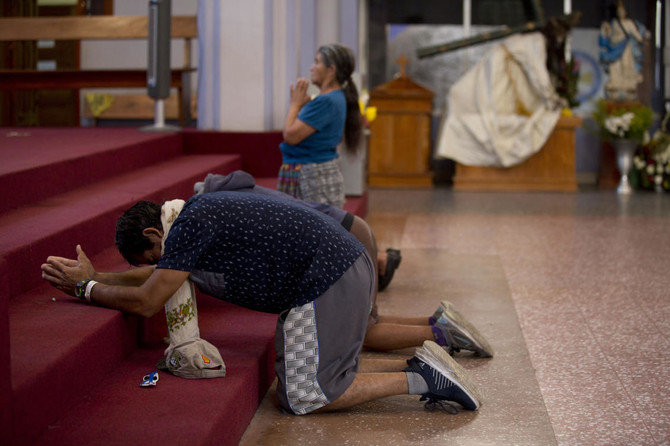
- The Argentine-born son of Italian immigrants has long held migration issue dear to his heart and has signaled that it will be a central theme during the trip
- Since his pontificate began in 2013, Francis has demanded governments do more to welcome and integrate those fleeing conflict, natural disasters and poverty
Biden says 'order must prevail' during campus protests over the war in Gaza

- “Dissent is essential for democracy. But dissent must never lead to disorder,” the president said at the White House
- The Democratic president broke days of silence on the protests with his remarks amid mounting criticism from Republicans
WASHINGTON: President Joe Biden on Thursday rejected calls from student protesters to change his approach to the war in Gaza while insisting that “order must prevail” as college campuses across the country face a wave of violence, outrage and fear.
“Dissent is essential for democracy,” Biden said at the White House. “But dissent must never lead to disorder.”
The Democratic president broke days of silence on the protests with his remarks, which followed mounting criticism from Republicans who have tried to turn scenes of unrest into a campaign cudgel. By focusing on a law-and-order message while defending the right to free speech, Biden is grasping for a middle ground on an intensely divisive issue in the middle of his reelection campaign.
He largely sidestepped protesters’ demands, which have included ending US support for Israeli military operations. Asked after his remarks whether the demonstrations would prompt him to consider changing course, Biden responded with a simple “no.”
Biden said that he did not want the National Guard to be deployed to campuses. Some Republicans have called for sending in troops, an idea with a fraught history. Four students were shot and killed at Kent State University by members of the Ohio National Guard during protests over the Vietnam War in 1970.
Tensions on college campuses have been building for days as demonstrators refuse to remove encampments and administrators turn to police to clear them by force, leading to clashes that have seized widespread attention.
Biden said he rejected efforts to use the situation to “score political points,” calling the situation a “moment for clarity.”
“There’s the right to protest, but not the right to cause chaos,” Biden said shortly before leaving the White House for a trip to North Carolina. “People have the right to get an education, the right to get a degree, the right to walk across campus safely without fear of being attacked.”
The White House also maintained its focus on combating antisemitism. Doug Emhoff, husband of Vice President Kamala Harris, spoke to Jewish students and Hillel leaders on Thursday to hear about their experience with threats and hate speech, according to a White House official.
Biden will make his own visit to a college campus on May 19 when he’s scheduled to deliver the commencement address at Morehouse University in Atlanta.
His last previous public comment on the demonstrations came more than a week ago, when he condemned “antisemitic protests” and “those who don’t understand what’s going on with the Palestinians.”
The White House, which has been peppered with questions by reporters, had gone only slightly further than the president. On Wednesday, press secretary Karine Jean-Pierre said that Biden was “monitoring the situation closely” and that some demonstrations had stepped over a line that separated free speech from unlawful behavior.
“Forcibly taking over a building,” such as what happened at Columbia University in New York, “is not peaceful,” she said. “It’s just not.”
Biden’s latest remarks weren’t well received in some corners of the Democratic Party.
“We need to prevent lawlessness in society. We need to have protections against hate speech,” said a social media post from Patrick Gaspard, president of the Center for American Progress and a former White House political director under President Barack Obama. “But we need to be able to hold space for active dissent and activism that is discomforting without blanket accusations of hate and violence against all activists.”
But Biden’s team has expressed confidence that his stance appeals to the widest array of voters. It also echoes his approach to nationwide unrest after the murder of George Floyd by a police officer four years ago, a politically volatile situation in the middle of his campaign against then-President Donald Trump.
“I want to make it absolutely clear rioting is not protesting, looting is not protesting,” Biden said then in remarks that his team turned into an advertisement. “It’s lawlessness, plain and simple, and those that do it should be prosecuted.”
Biden has never been much for protests of any kind. His career in elected office began as a county official when he was only 28 years old, and he’s always espoused the political importance of compromise.
As college campuses convulsed with anger over the Vietnam War in 1968, Biden was in law school at Syracuse University.
“I’m not big on flak jackets and tie-dyed shirts,” he said years later. “You know, that’s not me.″
The White House has also maintained its focus on combating antisemitism. Doug Emhoff, husband of Vice President Kamala Harris, spoke to Jewish students and Hillel leaders on Thursday to hear about their experience with threats and hate speech, according to a White House official.
Despite the administration’s criticism of violent college protests and Biden’s refusal to heed demands to cut off US support for Israel, Republicans blame Democrats for the disorder and have used it as a backdrop for press conferences.
“We need the president of the United States to speak to the issue and say this is wrong,” House Speaker Mike Johnson, a Louisiana Republican, said on Tuesday. “What’s happening on college campuses right now is wrong.”
Johnson visited Columbia University with other members of his caucus last week. House Republicans sparred verbally with protesters while speaking to the media at George Washington University in Washington, D.C., on Wednesday.
Trump, who is running for another term as president, also criticized Biden in an interview with Sean Hannity on Fox News.
“Biden has to do something,” he said. “Biden is supposed to be the voice of our country, and it’s certainly not much of a voice. It’s a voice that nobody’s heard.”
He repeated his criticisms on Wednesday during a campaign event in Waukesha, Wisconsin.
“The radical extremists and far-left agitators are terrorizing college campuses, as you possibly noticed,” Trump said. “And Biden’s nowhere to be found. He hasn’t said anything.”
Kate Berner, who served as deputy communications director for Biden’s campaign in 2020, said Republicans already had tried the same tactic during protests over Floyd’s murder.
“People rejected that,” she said. “They saw that it was just fearmongering. They saw that it wasn’t based in reality.”
Apart from condemning antisemitism, the White House has been reluctant to directly engage on the issue.
Jean-Pierre repeatedly deflected questions during a briefing on Monday.
Asked whether protesters should be disciplined by their schools, she said “universities and colleges make their own decisions” and “we’re not going to weigh in from here.”
Pressed on whether police should be called in, she said “that’s up to the colleges and universities.”
Asked on Thursday why Biden chose to speak on the matter after police had arrested protesters at the University of California, Los Angeles and at universities in New York City, Jean-Pierre stressed instead the importance of any protests being nonviolent.
“We’ve been very consistent here,” she said. “Americans have the right to peacefully protest as long as it’s within the law and violence is not protected.”
Students erect pro-Palestinian encampments across major Canadian universities

- “If public disruption is the only way to get our voice heard, then we are willing to do that,” says University of Toronto protest leader
- Some Jewish groups have accused protesters of being antisemitic, but organizers said some protesters are Jewish
TORONTO: Quebec Premier Francois Legault said on Thursday the encampment at Montreal’s McGill University should be dismantled as more students erected pro-Palestinian camps across some of Canada’s largest universities, demanding they divest from groups with ties to Israel.
The Canadian protests come as police have been arresting hundreds on US campuses and the death toll in Gaza has been mounting.
While McGill had requested police intervention, law enforcement had not stepped in Thursday to clear the encampment and said in a statement Thursday evening it was monitoring the situation.
Students also set up encampments at Canadian schools including the University of Toronto, the University of British Columbia and the University of Ottawa.
“We want the camp to be dismantled. We trust the police, let them do their job,” a spokesperson for Legault said.
There was also a pro-Israel counter-protest in Montreal Thursday. The two sides were kept separate.
On Thursday morning, students at the University of Toronto set up an encampment in a fenced-off grassy space at the school’s downtown campus where some 100 protesters gathered with dozens of tents.
According to a statement from organizers the encampment will stay until the university discloses its investments, divests from any that “sustain Israeli apartheid, occupation and illegal settlement of Palestine” and ends partnerships with some Israeli academic institutions.
Israel says it does not participate in apartheid and that its assault on Gaza does not constitute genocide.
A university spokesperson told Reuters it was “in dialogue with the protesters” and that, as of midday, the encampment was “not disruptive to normal university activities.”
University of Toronto graduate student and encampment spokesperson Sara Rasikh told Reuters they will remain until their demands are met.
“If public disruption is the only way to get our voice heard, then we are willing to do that,” she said.
Some Jewish groups have accused protesters of being antisemitic. Organizers deny that charge, noting that some protesters are Jewish.
Asked to comment on the encampments, Prime Minister Justin Trudeau’s office pointed to a statement he made on Tuesday, saying “Universities are places of learning, they’re places for freedom of expression ... but that only works if people feel safe on campus. Right now ... Jewish students do not feel safe. That’s not right.”
The protests follow the deadly Oct. 7 attack on southern Israel by Hamas militants from the Gaza Strip, which killed 1,200 people and saw dozens taken hostage, and an ensuing Israeli offensive that has killed about 34,000 and created a humanitarian crisis.
India deports Myanmar refugees who fled 2021 coup

- At least 38 refugees were deported on Thursday by the border state of Manipur
- ndia is not a signatory to the1951 UN Refugee Convention and has no law protecting refugees
GUWAHATI, India: India on Thursday deported the first group of Myanmar refugees who had sought shelter after a 2021 military coup, a top state minister said, following weeks of efforts that were hampered by fighting between Myanmar’s rebel forces and the ruling junta.
Thousands of civilians and hundreds of troops from Myanmar have crossed the border to India after the coup. This has worried New Delhi, which has announced plans to fence its border with Myanmar and end a visa-free movement policy.
At least 38 refugees were deported on Thursday by the border state of Manipur, which plans send back a total of 77 people as it copes with sporadic violence that has killed at least 220 people since ethnic clashes broke out in May last year.
“Without any discrimination, we have completed the first phase of deportation of illegal immigrants from Myanmar,” Manipur Chief Minister N. Biren Singh said in a social media post. “The state government is continuing the identification of illegal immigrants.”
One Indian national was also repatriated by Myanmar, Singh added.
New Delhi has not signed the 1951 UN Refugee Convention, which spells out refugee rights and states’ responsibilities to protect them, and it does not have its own laws protecting refugees.
Singh, who is from Prime Minister Narendra Modi’s Bharatiya Janata Party, said in March deportations had begun, but Indian security officials said the efforts were held up by fighting in Myanmar.
Modi is seeking a rare third straight term in ongoing national elections and his government has blamed the refugee influx as one reason for violence that has roiled Manipur.
Britain’s foreign secretary, in Kyiv, promises Ukraine aid for ‘as long as it takes’

- Cameron said Ukraine had a right to use the weapons provided by London to strike targets inside Russia
- 8 children injured in Russian strikes in Kharkiv region amid Cameron's visit
KYIV: British Foreign Secretary David Cameron promised three billion pounds ($3.74 billion) of annual military aid for Ukraine for “as long as it takes” on Thursday, adding that London had no objection to the weapons being used inside Russia.
“We will give three billion pounds every year for as long as is necessary. We’ve just really emptied all we can in terms of giving equipment,” he told Reuters in an interview on a visit to in Kyiv, adding that the aid package was the largest from the UK so far.
“Some of that (equipment) is actually arriving in Ukraine today, while I’m here,” he said.
Cameron said Ukraine had a right to use the weapons provided by London to strike targets inside Russia, and that it was up to Kyiv whether to do so.
“Ukraine has that right. Just as Russia is striking inside Ukraine, you can quite understand why Ukraine feels the need to make sure it’s defending itself,” Cameron told Reuters outside St. Michael’s Cathedral.
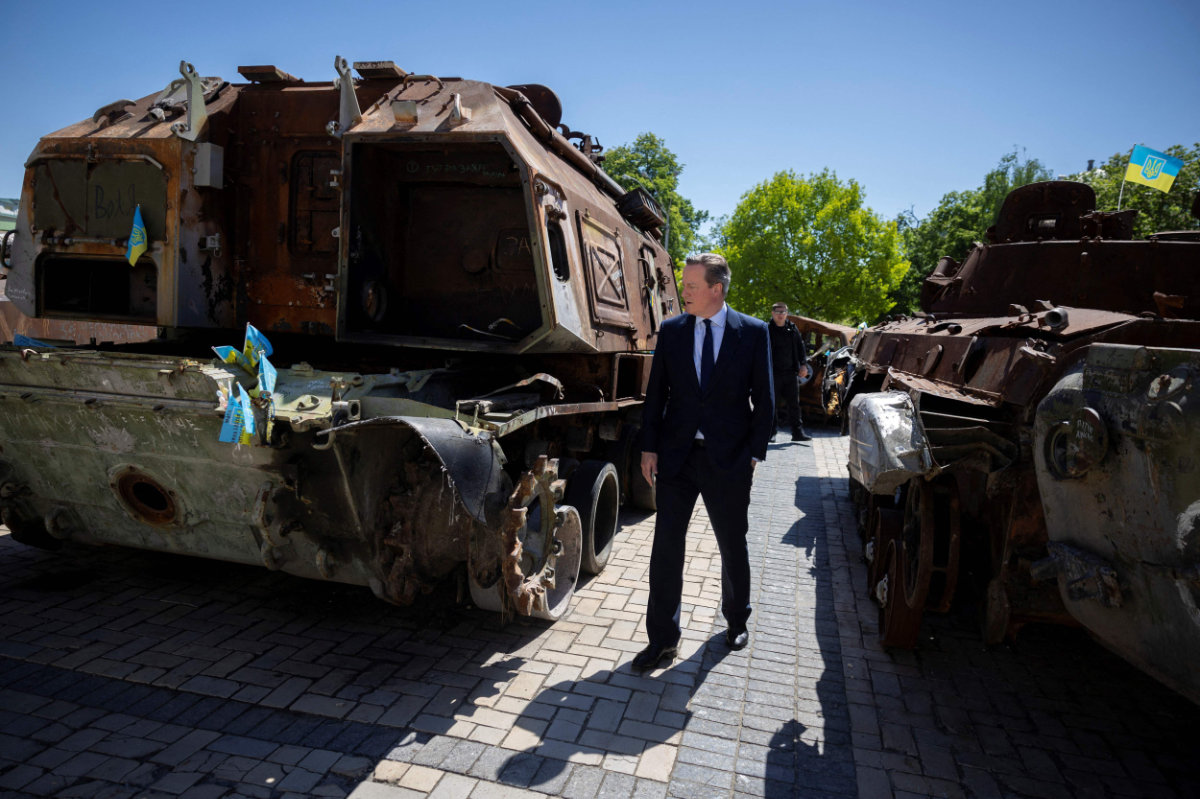
Cameron, who led the UK from 2010 and 2016 as prime minister and only returned to frontline politics several months ago, met Ukraine’s Foreign Minister Dmytro Kuleba and President Volodymyr Zelensky on his second visit to Kyiv as foreign secretary.
Britain’s top diplomat celebrated the release of a long-delayed $60 billion aid package by the US Congress.
“It’s absolutely crucial, not just in terms of the weapons it will bring, but also the boost to morale that it will bring to people here in Ukraine.”
Cameron did not answer directly when asked how he thought the possible re-election of Republican frontrunner Donald Trump to the White House could affect US support for Ukraine.
Trump and hard-line Republicans in Congress oppose further aid to Ukraine, with the possible exception of a loan.
“It’s not for us to decide who the Americans choose as their president — we will work with whoever that is,” Cameron said, adding that the strategy for Ukraine’s allies ought to be to ensure Ukraine is on the front foot by the time of the US elections in November.
Cameron met Ukraine’s FM Dmytro Kuleba and President Volodymyr Zelensky on his second visit to Kyiv as foreign secretary
Britain’s top diplomat celebrated the release of a long-delayed $60 billion aid package by the US Congress.
Russian strike injures 8 children
While Cameron was in Ukraine, Russian guided bombs struck a site close to a sports complex in Ukraine's northeastern Kharkiv region, injuring at least eight children, local officials said.
The town of Derhachi where the incident occurred is a frequent target of Russian aerial strikes. Police said the bombs had landed on premises near the sports centre, sparking fires.
"The air raid siren didn't sound, there was no siren at all," Yana Korobets, head of the sports complex, told Reuters Television.
"I was outside when... I heard a missile fly by. I understood it landed behind our sports complex. It blew out the windows, and because the children are barefoot in our class they suffered cuts in their legs and their hands."
Debris from shattered glass was strewn about the complex. Blood stains were spattered on a wall and on the floor. Outside, the ground was pocked with large craters.
Four of the children suffered moderate injuries and the others minor ones, regional governor Oleh Synehubov said on the Telegram messaging app. An elderly man was also wounded.
"The consequences could have been more tragic," Synehubov told national TV.
Derhachi is near the border with Russia. The Kharkiv region where it is located has long been targeted by Russian attacks but the strikes have become more intense in recent months, hitting civilian and energy infrastructure.
Moscow denies deliberately targeting civilians but thousands have been killed and injured in the war that began with the full-scale invasion of Moscow troops in February 2022.
Russia shipping fuel to North Korea above UN cap, says US
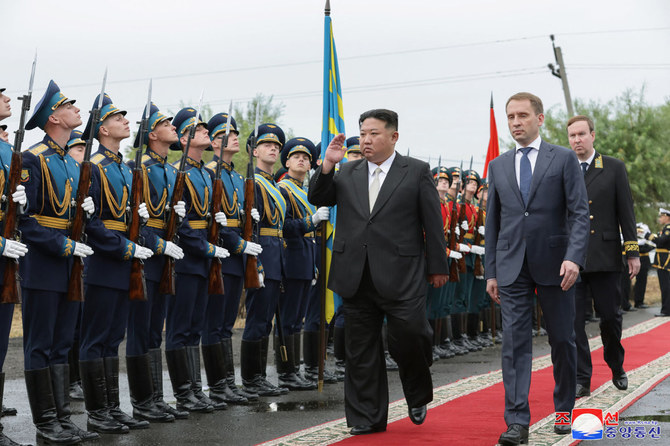
- Under UN sanctions, Pyongyang is limited to importing 500,000 barrels of refined products a year
- Last March, the US and South Korea in March launched a task force aimed at preventing North Korea from procuring illicit oil
WASHINGTON: Russia has been quietly shipping refined petroleum to North Korea at levels that appear to violate a cap imposed by the United Nations Security Council, the White House said on Thursday, with new sanctions to come soon in response.
The disclosure came on the first day after a UN panel of experts monitoring enforcement of longstanding UN sanctions against North Korea for its nuclear weapons and missile programs was disbanded after a Russian veto.
“At the same time that Moscow vetoed the panel’s mandate renewal, Russia has been shipping refined petroleum from Port Vostochny to the DPRK (North Korea),” White House national security spokesperson John Kirby told reporters.
Under UN sanctions, Pyongyang is limited to importing 500,000 barrels of refined products a year. The Russian and North Korean UN missions in New York did not immediately respond to a request for comment on the US accusation.
Kirby said that in March alone, Russia shipped more than 165,000 barrels of refined petroleum to North Korea and that given the close proximity of Russian and North Korean commercial ports, Russia could sustain these shipments indefinitely.
Russia blocked the annual renewal of the UN sanctions monitors in late March in what a US official described as a calculated move by Moscow to hide its own violations of UN Security Council resolutions.
Kirby said the United States will continue to impose sanctions “against those working to facilitate arms and refined petroleum transfers between Russia and the DPRK.” North Korea is formally known as the Democratic People’s Republic of Korea.
“We have previously worked to coordinate autonomous sanctions designations with our partners — including Australia, the European Union, Japan, New Zealand, the Republic of Korea, and the United Kingdom — and we will continue to do so,” he said.
State Department spokesperson Matt Miller said the United States and its allies are working to announce “new coordinated sanctions designations this month.”
The US and South Korea in March launched a task force aimed at preventing North Korea from procuring illicit oil.
The US and others have also accused North Korea of transferring weapons to Russia for use against Ukraine, which it invaded in February 2022. Both Moscow and Pyongyang deny the accusations, but vowed last year to deepen military relations.
The debris from a missile that landed in the Ukrainian city of Kharkiv on Jan. 2 was from a North Korean Hwasong-11 series ballistic missile, UN sanctions monitors told a Security Council committee in a report seen by Reuters on Monday.


